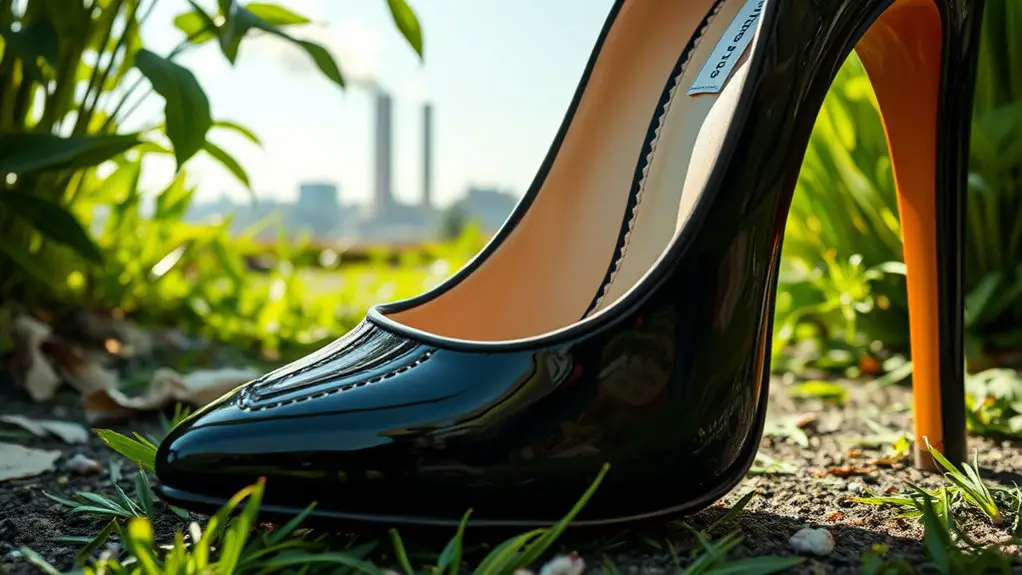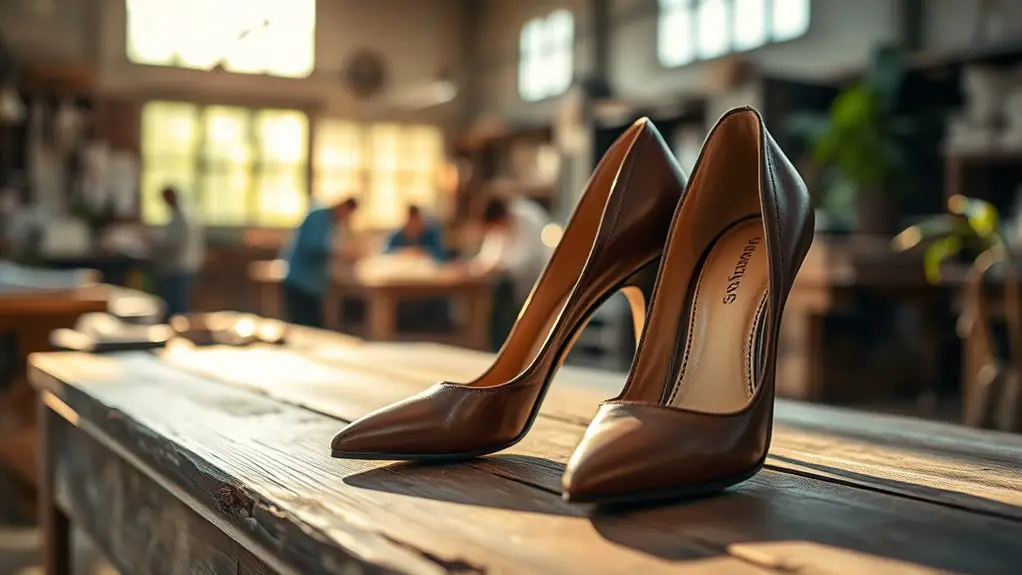Ethical manufacturing matters in high heel production because it minimizes environmental harm and protects workers’ rights. By prioritizing sustainable materials and practices, brands can reduce their ecological footprint while promoting fair labor conditions. Transparency in supply chains builds consumer trust, which is increasingly essential in today’s market. Consumers like you play a significant role in driving this change by supporting brands that are committed to ethical standards and sustainable practices. Discover how these shifts are shaping the future of fashion.
The Impact of High Heel Production on the Environment

While high heels may elevate your style, their production often has a significant environmental footprint that can’t be ignored. The process of manufacturing these fashionable shoes typically involves the use of non-renewable resources, excessive water consumption, and toxic chemicals. Each pair contributes to a larger ecological footprint, affecting ecosystems and communities alike.
Consider the sourcing of materials like leather and synthetic fibers, which often leads to deforestation and pollution. The environmental impact goes beyond the production phase; transportation and disposal further exacerbate the issue, as high heels often end up in landfills.
As a consumer, you have the power to influence change. By choosing brands that prioritize ethical manufacturing practices, you can help mitigate the negative impacts of high heel production. It’s essential to recognize that every purchase carries weight, and opting for sustainability can contribute to a healthier planet.
Sustainable Materials: Choosing the Right Resources
The choice of materials in high heel production plays a pivotal role in determining their environmental impact. By opting for sustainable materials, you can greatly reduce the carbon footprint of your footwear. Consider these options for an eco-conscious approach:
- Biodegradable alternatives that break down naturally after disposal.
- Recycled textiles that divert waste from landfills and lessen resource extraction.
- Organic leather sourced without harmful chemicals, promoting healthier ecosystems.
- Plant-based materials that utilize renewable resources, minimizing dependence on fossil fuels.
- Low impact dyes that avoid toxic chemicals, ensuring cleaner water systems.
Choosing these materials not only fosters ethical manufacturing but also aligns with resource-efficient processes. By prioritizing eco-conscious sourcing, you contribute to a more sustainable future, paving the way for responsible high heel production that respects both the planet and its resources.
Labor Rights in the Fashion Industry

Understanding labor rights in the fashion industry is essential for ensuring that ethical manufacturing practices extend beyond materials to include the welfare of workers. The garment industry often faces criticism for worker exploitation and sweatshop practices, where poor labor conditions prevail. Advocating for fair wages and a living wage is imperative to protect workers’ rights and promote social responsibility. By supporting ethical sourcing, you contribute to a system that prioritizes worker dignity and safety.
Labor unions play an important role in this movement, empowering workers to advocate for their rights. Ethical audits can help monitor compliance with labor standards, ensuring transparency in the supply chain. As a consumer, you can influence these practices by choosing brands committed to ethical manufacturing. By demanding accountability, you help shift the industry towards fairer labor conditions, ultimately fostering a more just and equitable fashion landscape.
The Role of Transparency in Supply Chains
Transparency in supply chains is increasingly recognized as a fundamental aspect of ethical manufacturing, particularly in the high heel production sector. You might not realize it, but supply chain transparency plays an essential role in ensuring ethical sourcing practices. When companies openly share their sourcing and production processes, they foster trust and accountability. Here are some key reasons why it matters:
- Consumer Trust: Transparent practices build loyalty and confidence in your brand.
- Risk Mitigation: Knowing your suppliers reduces the chance of unethical practices.
- Sustainability: Transparency encourages eco-friendly materials and methods.
- Compliance: Adhering to ethical standards becomes easier with clear supply chains.
- Empowerment: You can make informed choices that align with your values.
Consumer Awareness and Ethical Choices

When you choose high heels, your decisions can greatly impact the environment and workers’ rights. By prioritizing brands that focus on sustainable material sourcing and fair labor practices, you not only elevate your style but also align your purchases with your values. Increasing your awareness of these ethical choices empowers you to support a more responsible fashion industry.
Sustainable Material Sourcing
As consumers become more aware of the environmental impact of their purchases, the demand for sustainable material sourcing in high heel production has grown considerably. By choosing brands that prioritize eco-friendly practices, you’re making a significant impact. Consider the following sustainable materials:
- Biodegradable materials that break down naturally
- Recycled textiles reducing waste and resource use
- Organic leather, free from harmful chemicals
- Eco-friendly adhesives that minimize toxicity
- Plant-based components and low impact dyes for a greener footprint
Brands adopting closed loop systems and sustainable packaging are leading the way, ensuring that every step of production is environmentally conscious. By supporting these initiatives, you not only contribute to a healthier planet but also encourage more companies to embrace sustainable practices in their high heel production.
Fair Labor Practices
While you may focus on the style and design of high heels, it’s crucial to contemplate the ethical implications behind their production. Fair labor practices are paramount in guaranteeing that workers receive fair wages and operate in safe environments. By choosing brands that prioritize these values, you support a more just industry.
| Aspect | Importance | Impact |
|---|---|---|
| Fair Wages | Guarantees living standards | Reduces poverty and exploitation |
| Worker Safety | Prevents injuries and harm | Promotes a healthier workforce |
| Ethical Brands | Drives industry change | Encourages responsible consumerism |
As a consumer, your choices can influence manufacturing practices. Make informed decisions, and advocate for fair labor in the high heel market. Your support matters.
The Economic Benefits of Ethical Manufacturing
Although some may view ethical manufacturing as merely a moral choice, it also presents significant economic benefits that can enhance both brand reputation and profitability. By embracing ethical practices, you can foster economic growth while standing out in a crowded market. Here’s how ethical manufacturing can positively impact your business:
- Increased brand loyalty: Customers are more likely to support brands that align with their values.
- Enhanced consumer trust: Transparency in production processes builds credibility and fosters trust.
- Market differentiation: Ethical manufacturing sets your brand apart from competitors, attracting discerning consumers.
- Improved employee morale: Fair labor practices lead to a more motivated workforce, boosting productivity.
- Long-term profitability: Sustainable practices often result in cost savings and reduced waste.
Investing in ethical manufacturing isn’t just an ethical decision; it’s a strategic move that can propel your brand toward lasting success.
Innovations in Eco-Friendly High Heel Design
As you’re exploring eco-friendly high heel designs, consider how sustainable materials are revolutionizing the industry. Innovative manufacturing techniques not only reduce waste but also enhance the durability of your favorite styles. By choosing ethically produced heels, you’re not just making a fashion statement; you’re supporting a healthier planet.
Sustainable Materials Utilization
When you consider the impact of high heel production on the environment, it’s clear that sustainable materials are no longer optional but essential for responsible manufacturing. By prioritizing eco-friendly options, you can greatly reduce your carbon footprint. Here are some key innovations to look for:
- Biodegradable materials to minimize waste.
- Recycled components that give new life to discarded products.
- Natural fibers like organic cotton or hemp for uppers.
- Sustainable leather alternatives made from plant-based sources.
- Water-based adhesives that reduce harmful chemicals.
Choosing high heels made from these materials not only supports ethical manufacturing but also contributes to a healthier planet. Embracing sustainable practices in fashion is a step towards a more responsible industry.
Innovative Manufacturing Techniques
Innovative manufacturing techniques are transforming the high heel industry, making it possible to create stylish footwear without compromising environmental integrity. 3D printing is leading the charge, allowing for intricate designs while minimizing waste. Pairing this technology with biodegradable components means you can enjoy fashionable heels that won’t harm the planet.
Here’s a look at some innovative approaches:
| Technique | Benefits | Impact on Environment |
|---|---|---|
| 3D Printing | Customizable designs | Reduces material waste |
| Biodegradable Leather | Eco-friendly alternatives | Decomposes naturally |
| Recycled Materials | Less reliance on virgin resources | Lowers carbon footprint |
| Digital Prototyping | Faster design iterations | Limits resource consumption |
| Modular Design | Easy repairs and upgrades | Extends product lifespan |
Embracing these innovations is essential for a sustainable future in high heel fashion.
The Importance of Certification and Standards
Certification and standards play an essential role in promoting ethical manufacturing practices in high heel production. They not only establish a benchmark for quality but also reinforce consumer trust. Understanding the certification importance and standards compliance is vital for both consumers and manufacturers. Here’s how:
- Consumer Protection: Certifications safeguard you from subpar products.
- Environmental Responsibility: Standards guarantee brands adopt sustainable practices.
- Fair Labor Practices: Certifications promote ethical working conditions.
- Quality Assurance: Compliance ensures durability and safety.
- Market Differentiation: Certified brands stand out in a crowded market.
Case Studies: Brands Leading the Way in Ethical Manufacturing
As the demand for ethical manufacturing grows, several brands have emerged as leaders in high heel production, showcasing how responsible practices can coexist with style and luxury. For instance, brands like Stella McCartney have set the standard by engaging in ethical collaborations that prioritize sustainable materials while ensuring fair labor practices. By committing to transparency in their supply chains, they’ve built trust with discerning consumers who increasingly value ethical considerations in their purchasing decisions.
Moreover, consumer influence plays a pivotal role in this shift. When you choose brands that prioritize ethics, you’re not just buying shoes; you’re endorsing a movement towards responsible production. This conscious consumerism encourages more brands to adopt ethical practices, creating a ripple effect across the industry. In short, supporting these pioneering brands not only enhances your wardrobe but also contributes to a more sustainable and responsible fashion landscape.
The Future of High Heels: A Shift Towards Sustainability
As you consider the future of high heels, it’s clear that sustainable practices are becoming essential. Using eco-friendly materials and ensuring ethical labor practices not only reduce environmental impact but also enhance brand loyalty among conscious consumers. Embracing these changes can position your brand as a leader in a market increasingly focused on sustainability.
Eco-friendly Materials Usage
While the allure of high heels has long captivated fashion enthusiasts, the industry is undergoing a pivotal transformation towards sustainability through the adoption of eco-friendly materials. By embracing eco-friendly innovations, brands are not only appealing to conscious consumers but also reducing their environmental impact. Here’s why you should care:
- Biodegradable materials minimize landfill waste and pollution.
- Sustainable sourcing of materials conserves natural resources.
- Low-impact dyes reduce chemical runoff into ecosystems.
- Recycled components lessen the demand for virgin materials.
- Ethical production practices enhance brand integrity.
Choosing high heels made from eco-friendly materials helps you make a statement without compromising your values. As the industry shifts, you’ll find that sustainable fashion can be both stylish and responsible.
Ethical Labor Practices
The fashion industry is increasingly recognizing that ethical labor practices are essential for a sustainable future in high heel production. By prioritizing ethical sourcing, brands can guarantee that materials are obtained from suppliers committed to fair treatment and wages for workers. This not only enhances the quality of the product but also fosters a sense of labor empowerment among employees. When workers feel valued, productivity rises, leading to better craftsmanship and innovation. Consumers are becoming more aware of these practices and are likely to support brands that align with their values. Embracing ethical labor practices isn’t just a moral obligation; it’s a strategic move that can drive customer loyalty and long-term success in the competitive high heel market.
Frequently Asked Questions
How Can Consumers Identify Ethical High Heel Brands?
To identify ethical high heel brands, look for brand transparency and research their production practices. Consumer education plays a crucial role; check certifications, reviews, and sustainability reports to guarantee your choices align with ethical standards.
What Are the Main Challenges in Ethical High Heel Production?
When considering ethical high heel production, you’ll face sustainability challenges like sourcing eco-friendly materials and ensuring fair labor practices. Balancing these factors is essential for brands committed to making a positive impact in the industry.
Are There Certifications for Ethical High Heel Manufacturers?
Yes, there’re certification standards for ethical high heel manufacturers, often requiring ethical audits. These certifications help guarantee compliance with labor rights and environmental practices, giving you confidence in the sustainability and responsibility of your footwear choices.
How Do Ethical Practices Affect High Heel Pricing?
Ethical practices often increase high heel pricing due to sustainable materials and fair labor costs. While this may seem steep, investing in responsibly made products ultimately supports better quality and promotes environmental and social responsibility.
Can Ethical Manufacturing Improve Brand Reputation in the Fashion Industry?
Imagine a brand that proudly wears a “compassionate” badge, boosting consumer trust and brand loyalty. Ethical manufacturing can enhance your reputation, turning you into the fashion industry’s golden child, while competitors scramble in outdated practices.
